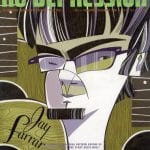Loudon Wainwright III – My image of myself is as a songwriter
“When you were alive/I was never alone/Somewhere in the world/There was something called home.” Rhymes, plainspoken and plainly felt, open the last song of Last Man On Earth, the 19th album by Loudon Wainwright III, his first set of new compositions in four years. The lines refer to love, not for a wife or a lover, but to that first love: his mother. The song, “Homeless”, is one of thirteen he wrote after his mother’s passing in 1997, after which, he says, “my world fell apart.”
Taken together, the songs present a man alone, often with just his guitar or banjo, sometimes joined by friends he’s known for years (and one of his talented ex-wives, but not his equally gifted children), telling the simplest, most severe truth of all: We can’t last. The man sings, and you know, even in the wry sweetness of his voice, that, like the one who gave him life, he’s ultimately going out the same way he came in: unnamed, strange, unable to comprehend it all. “Now and then identical,” he sings as if recalling a poem by T.S. Eliot he might have read in school, “Though they are not the same/And future waves will erase both/As if I never came.”
Each of these new songs, written while in residence at his mother’s cottage in Katonah, New York, meditates on mortality without pity, without ellipsis, without abstraction, without, barely, recourse to the masks of metaphor and irony. The loss just is. Wainwright has never written better songs, never made a more whole and affecting album.
That’s a big statement, especially applied to a songwriter in his 31st year of recording. Last Man On Earth, however, is Wainwright’s first album to transcend, from start to finish, its moment of conception, though it remains, like all of his work, intensely self-reflective, intensely relevant to these days. With the exception of the title track, there are no topical songs, and even that tune, the album’s longest, is as much a condemnation of 21st-century foibles and fools as it is a long, hard, painful laugh at himself.
I. THE WHOLE HOUSE OF CARDS HAD COME DOWN
NO DEPRESSION: Where were you the week of September 11, 2001?
LOUDON WAINWRIGHT: I was on Shelter Island, which is on Long Island, on the 11th. I came into the city the day after, because I have an apartment in Brooklyn Heights, across the East River from Lower Manhattan. I didn’t lose any friends or family. I was lucky that way. My feelings are the same as everyone’s: horror, fear, and sadness. And anger too. It’s hard to try to figure out what to say. We’re all going to be processing this for a long time.
ND: What do you remember about the time at which you wrote these new songs?
LW: I came apart a bit at that time. I went into a depression, I suppose, which is appropriate. My mother had been a supportive, important person in my life. I felt without support. So I stopped doing stuff. I wound up living in this cottage she lived in. I just got through the days. With the passage of time and some help, I got back to where I could start working again. That’s when I started writing songs. It wasn’t a writer’s block. There are periods where I make myself write songs, just to do it. My image of myself is as a songwriter. But everything had been shook up. The whole house of cards had come down. I didn’t even want to pick up the guitar. But then with help I felt better, and then I sure had something to write about.
ND: What was it like living in Katonah, where your mother lived?
LW: It’s in northern Westchester New York. A wealthy enclave. I grew up about three miles away from there. To go back and live in this cottage, surrounded by all these relics, and I was very familiar with all the roads, it was a reversion of sorts. In that cottage were all the family artifacts, going back to my childhood. I lived there a year and half. I just lived my life as best I could.
ND: Do you remember the first song you wrote for the album?
LW: Yep. “I’m Not Gonna Cry”.
ND: How did you write it?
LW: I can’t remember if I wrote in on banjo or guitar. The way I write is usually the same thing. I’ll get an opening line, and I’ll write it down, and then I’ll start writing more. I’ll pick up the guitar, banjo, very infrequently the piano. I’ll fashion a very simple tune to put on it. In the case of that song, I just woke up and said, ‘I’m not gonna cry today.” Just the sound of that was enough. It felt like a nibble, and you start to pull it into the boat.




